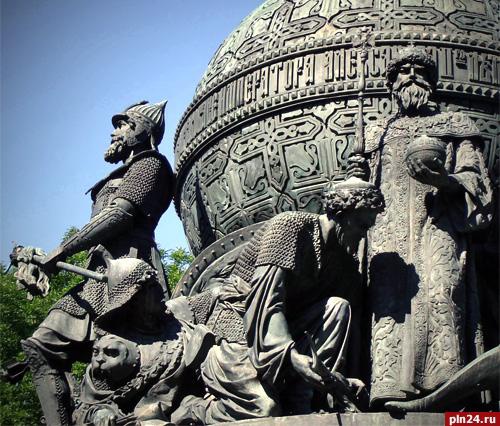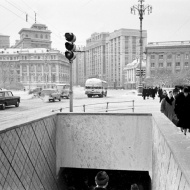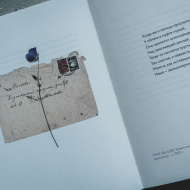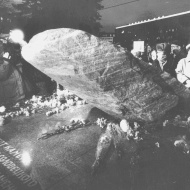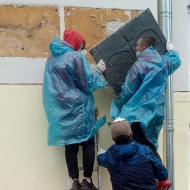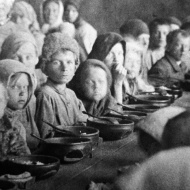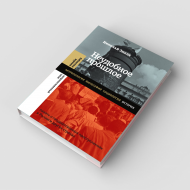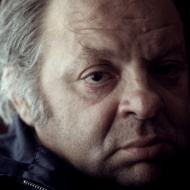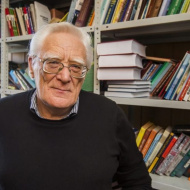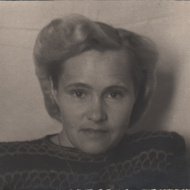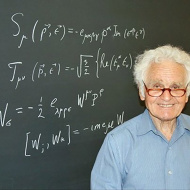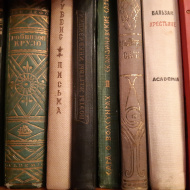The coming history year. Russian historical policy in July 2011. Analytical report.
The July report of the monitoring is based on 68 news items collected and written this month. Its objective is to sum up basic problems and issues arisen in Russian historical policy for the reporting period, and to tell about them on the basis of the material divided under several headings.
More than one sixth of all the news items for this month (all in all 12 items) are directly or indirectly connected with the topic of political repressions in the USSR – hence these events were unite in one group described separately under the heading “Topic of the month”.
“Memorial date” of the month is 16 July, another anniversary of the execution of the tsar's family. This date provoked anti-Bolshevist statements of one of notable members of “United Russia” deputy Vladimir Medinsky.
“Event of the month” was the speech of President Dmitry Medvedev at the session devoted to the preparation for the celebration of 1150th anniversary of Russian nationhood. Medvedev told about the most important, in his opinion, issues connected with the development of history in our country. Within the framework of the monitoring his speech appeared as a peculiar set of points for the Year of Russian history to be declared in 2012.
Topics observed in the previous reviews – de-Stalinization (see urokiistorii.ru/2123, urokiistorii.ru/2129, urokiistorii.ru/2148,urokiistorii.ru/2197), election campaign, directly connected with the use of certain historical images, first of all those of Lenin and Stalin by the RF Communist Party (see urokiistorii.ru/2145) developed. A tough clash of two new structures of the “United Russia” and communists – People's Front and People's Home Guard – also continued (see urokiistorii.ru/2114).
Many «Special cases» of this month also contain a “heroic” reference – thus in Irkutsk bathroom equipment sellers employ an image of St.George's ribbon in their advertising campaign (see urokiistorii.ru/2199), while Dmitry Medvedev, in a wish to make Russian historical education more influential on children's minds, comes up with an idea of a computer game following the pattern of the World Of Warcraft (also known as WoW) – based on the materials of national history (see urokiistorii.ru/2179).
The sources of news were websites of political parties, newswires on web portals and online versions of the media (newspapers, radio and TV channels) including the regional ones, the web sites of nongovernmental organizations
Full thematic index of the July news can be found at the end of the report.
Topic of the month: Political repressions in the USSR. Immortalization of the memory of the victims, problems of memorialization
It is probably due to the fact that in spring the greater part of effort of the masters of historical policy are as a rule devoted to the preparation of events connected with 9 May, that the first two summer months of 2011 were the time for initiatives related with the preservation of memory of victims of political repressions. Another explanation of an increased interest in this topic in June and July is probably the fact that in Russia, due to climatic conditions, summer months are the most favorable time for the erection of memorial plates and memorials, steles and obelisks on the graves.
At the beginning of the month patriarch Cyril went to Valaam, where in the course of his trip he visited the local nursing home where disabled soldiers, victims of the Great Patriotic War, were sent in mass. After a memorial service the patriarch gave a speech near a memorial cross to the victims and heroes of the war and said, in particular:
«I very well remember the people, in whose memory this cross was erected. These are people who were severely injured in the Great Patriotic War. I have never seen such handicap in my life. Many of them didn’t have arms or legs, but most of all, I guess, they suffered because their homeland, for the freedom of which they sacrificed their health and even their life, could think of nothing better than sending them here, to this cold island, far away from the society of the winners…» (see urokiistorii.ru/2128).
In Dagestan tribute was paid to other victims of the Great Patriotic War – deported nations. A Kazakh documentary “The Promised Land” was shown there (see urokiistorii.ru/2137).
“Memorial” Society became an initiator and an active participator in a few events – it prepared an exhibition “Uncrushed” in Tomsk (see urokiistorii.ru/2140), and assisted in the erection of a memorial stone to Latvian victims of political repressions in the same city (see urokiistorii.ru/2164).
The words of the chair of the Board of Trustees of the Republican foundation of reconstruction of historical and cultural memorials of Tatarstan, ex-president of the republic Mintimer Shaimiyev, pronounced on the occasion of the opening of a museum on the island of Sviyazhsk, where a colony with a huge number of “political” prisoners was located in Soviet times, are typical:
“It was not accepted to talk about it before, but now we can’t hush this topic up”.
At that Shaimiyev stigmatizes as “political terror” the action of Lev Trotsky who ordered a decimation (shooting of every tenth person) in one of the Red Army regiments which permitted itself a retreat in 1918 (see urokiistorii.ru/2170). It is noteworthy that in Shaimiyev’s statement the notions of “repressions” and “political terror” go beyond the usual for official rhetoric framework of the 30-ties.
At the end of the month traditional civil forum “Pilorama” took place on the territory of the museum located on the spot pf the former camp “Perm-36”, within the framework of which several debatable topics directly connected with the program “On the immortalization of the memory of the victims of totalitarian regime and on national reconciliation” were discussed (see urokiistorii.ru/2195).
On the whole, it should be noted that with the exception of the last example few participants and a very limited public attention are typical features of all the actions on this topic. Mostly the matter concerns private or independent initiatives on the periphery of the state historical policy.
Introducing the “Memorial date of the month” we should also mention an active participation of the CPRF party in the polemics on a traditionally difficult for communists topic of repressions symbolizing a dark side of the Soviet heritage, which was typical in July 2011. thus, criticizing the project of the “best lesson on the topic of political repressions” of Memorial in Penza, CPRF blames the organization for “brain-washing of inexperienced in history and politics citizens”. The commentary on the web site of the party ends with an exclamation: “We wish Beriya were here for you!” (see urokiistorii.ru/2136).
Memorial date of the month: 16 July– 93rd anniversary of the shooting of the tsar’s family
In 2011 “United Russia” draws attention to this date with a series of statements on its web site given by a well-known political scientist, member of the commission for counteracting falsification of history to the prejudice of Russia Vladimir Medinsky. He develops the topic of Bolshevist crimes (in Jun Medinsky talked in detail about the horrors of the suppression of Antonov’s revolt – see urokiistorii.ru/2099) and suggests organizing mass renaming of the streets with Bolshevist names and establishing a “day of the memory to victims of Bolshevism” – 16 July (see urokiistorii.ru/2158).
It’s noteworthy that Medinsly’s initiatives with regard to the renaming of streets fully repeat the points of the “program of de-Stalinization” (in more detail see urokiistorii.ru/2467), which has been criticized throughout spring by members of “United Russia” as well.
Observers of “Vzglyad.ru” partially explained the attacks of “United Russia” on historical position of the present-day CPRF by the aspiration of the party to win the votes of educated citizens, who are in the know of historical succession of CPRF from the Soviet party of Bolsheviks (see urokiistorii.ru/2158).
Finally, the evaluation of the memorial date would not be complete without the presentation of the opposite point of view expressed by the leader of communists Gennady Zyuganov in his book “Stalin and the present”, where he writes that communists did not kill the tsar’s family. However, the CPRF leader does not give any distinct alternative explanation of the events of 17-18 July 1918 to his readers.
Event of the month: Points of Dmitry Medvedev’s speech on the Year of Russian history
On 22 July Dmitry Medvedev spoke out with a policy statement at the joint panel session of the Council for culture and art and Council for science, technology and education in Vladimir devoted to the preparation of the celebration of 1150th anniversary of Russian nationhood. The official President’s web site published the record of his speech.
Medvedev’s speech contained several important layers. First of all – the very justification of the necessity of celebration of quite an artificial date – 1150 years after “the invitation f the Varangians to Rus’” in 862 – the date taken from the “Tale of Bygone Years”:
“The meaning is obvious: consolidation of our country, our nation with a view to further development of our big and very complicated state”, says the president.
For Medvedev this date exists in the context of the celebration of 1000th anniversary of Rus’, which fell on a turning point in the history of the state – the great reforms of Alexander the Second. The president intentionally reminded the audience of this parallel:
“The 1000th anniversary of Russia fell on one of the most complicated and at the same time the most dynamic periods of the development of our state. The so-called great liberal reforms were under way, which, in fact, changed the whole country and determined the trend of its development for many years. Actually, the initiator of these anniversary festivities, emperor Alexander II, thought that they would not only provide a stimulus for a rise of our state but would also promote closer relations between the power and the people”.
Finally, Medvedev reminded of “feudal fragmentation” (without mentioning, but obviously implying the period of XII – XIII centuries, till the appearance of Tatars and Mongols in Rus’) and said that already in those times the “fragmentation” and absence of consolidation were considered as factors of weakening of a state
Direct statements on “historical policy” (implemented or desirable) were present in Medvedev’s speech in three aspects:
- condition of monuments: “our task is to try to preserve them, all the more so that still the cultural layer, the so-called material culture was lost for many decades (during the Soviet period, and partially in the post-Soviet period and even before the Soviets). In this sense, in terms of the number of material culture objects we produce a worse impression than Western European countries”;
- family history: “at present the interest in this is awakening, but again, if we compare the situation , let’s say, to the situation in Western Europe, and in many other parts of the world, almost any citizen, regardless of his origin and rank, can trace the history of his ancestors to many generations back. While it was erased from our memory, there were ideological explanations to this, as you remember, people gave up their relatives and their social descent, as it was customary to say. But in fact this is a part of our common history, and an attitude to the state history depends on the attitude to one’s family history”;
- teaching history: complicated historical topics at school, their coverage in history textbooks: “we’ve been talking now, if it is possible to stick to various positions in all issues or still, in the history of our country, from the point of view of teaching and not scientific approach, I would like to stress it <…> the examples are obvious: attitude to the Great Patriotic War, to the World War II. Is it possible to offer another interpretation in, let’s say, history textbooks? I would like to say at once: in my opinion, no, it would be harmful”.
Among the key dates of 2012, besides the 1150th anniversary of Russian nationhood, the president named 200th anniversary of the 1812 Patriotic War and 150th anniversary of Pyotr Stolyin.
July news: special cases
«A short spring of bathroom equipment in Irkutsk». Irkutsk department of the Federal Anti-monopoly service turned to the local Veteran’s council with an enquiry if advertisement banners of the bathroom equipment “Brigantina” hanging in the city insult the feelings of the war veterans?
«An equation on Lenin». In Murmansk unknown persons draw a Nazi swastika and a Soviet coat of arms on the pedestal of Lenin’s monument, having put an equality sign between then.
«Museum of artifacts from Soviet scientists’ homes instead of a dump”. The museum is located in the Moscow district Schukino, the entrance is free, the local chair of the proprietors’ cooperative gives tours upon preliminary agreement.
«A long time ago in a galaxy far, far away». President Dmitry Medvedev came up with a suggestion of a new computer game World Of Warcraft basing on the material of the national history.
«Solovyovskaya crossing: free and easy patriotic festival». The Second International tourist festival “Solovyovskaya crossing” takes place in Smolensk region on 29-31 July. Its aim is “a patriotic education of youth in the best traditions of national history and spiritual heritage”.
Thematic index of July news:
Anna Akhmatova: urokiistorii.ru/2168
Andrey Bogolubsky: urokiistorii.ru/2110
Veterans: urokiistorii.ru/2125,urokiistorii.ru/2146, urokiistorii.ru/2196,urokiistorii.ru/2199, urokiistorii.ru/2205
Sakharov: urokiistorii.ru/2106,
The Great Patriotic War: urokiistorii.ru/2108, urokiistorii.ru/2109, urokiistorii.ru/2124, urokiistorii.ru/2122,urokiistorii.ru/2125, urokiistorii.ru/2134, urokiistorii.ru/2143, urokiistorii.ru/2192,urokiistorii.ru/2196, urokiistorii.ru/2199, urokiistorii.ru/2202, urokiistorii.ru/2205
The 1812 war: urokiistorii.ru/2116, urokiistorii.ru/2126, urokiistorii.ru/2130,urokiistorii.ru/2169
«City of military glory »: urokiistorii.ru/2142
«De-Stalinization»: urokiistorii.ru/2123, urokiistorii.ru/2129, urokiistorii.ru/2148,urokiistorii.ru/2197
«Children of the war», Spravedlivaya Rossiya: urokiistorii.ru/2111
United Russia: urokiistorii.ru/2158
Ekaterina II: urokiistorii.ru/2168
Historical literary award: urokiistorii.ru/2181
Historical reconstruction: hurokiistorii.ru/2130, urokiistorii.ru/2151
Katyn’: urokiistorii.ru/2150
Cinema: urokiistorii.ru/2137, urokiistorii.ru/2182, urokiistorii.ru/2200
Conference on the preservation of historical image of cities:urokiistorii.ru/2204
CPRF: urokiistorii.ru/2145, urokiistorii.ru/2132, urokiistorii.ru/2156
Kurile islands: urokiistorii.ru/2121
Lenin: urokiistorii.ru/2138, urokiistorii.ru/2145, urokiistorii.ru/2167
Medvedev. Points for the Year of Russian history: urokiistorii.ru/2180
Memorial plates: urokiistorii.ru/2191
Museum: urokiistorii.ru/2193
«Molodaya Gvardiya»: urokiistorii.ru/2117
People’s Home Guard vs. People’s Front: urokiistorii.ru/2113,urokiistorii.ru/2114
«On civil peace», LDPR: urokiistorii.ru/2112
Monuments: urokiistorii.ru/2133, urokiistorii.ru/2141, urokiistorii.ru/2156,urokiistorii.ru/2168, urokiistorii.ru/2167, urokiistorii.ru/2184, urokiistorii.ru/2198
Memory of Belovezhsk agreements: urokiistorii.ru/213
Patriotic festival: urokiistorii.ru/2203
Renaming: urokiistorii.ru/2138, urokiistorii.ru/2185
Repressions in the USSR: urokiistorii.ru/2128, urokiistorii.ru/2137, urokiistorii.ru/2136,urokiistorii.ru/2140, urokiistorii.ru/2149, urokiistorii.ru/2158, urokiistorii.ru/2164,urokiistorii.ru/2170, urokiistorii.ru/2189, urokiistorii.ru/2187, urokiistorii.ru/2184,urokiistorii.ru/2195
Russian Orthodox Church: urokiistorii.ru/2128, urokiistorii.ru/2143, urokiistorii.ru/2148, urokiistorii.ru/2155,urokiistorii.ru/2189
St. Pyotr and Fevroniya: urokiistorii.ru/2117
Sochi, historical places: urokiistorii.ru/2157
Stalin: urokiistorii.ru/2133, urokiistorii.ru/2145, /urokiistorii.ru/2148, urokiistorii.ru/2156
Stolypin: urokiistorii.ru/2141, urokiistorii.ru/2161, urokiistorii.ru/2185,urokiistorii.ru/2198
Chkalov: urokiistorii.ru/2182
School: urokiistorii.ru/2136, urokiistorii.ru/2186
1991, Vilnius events: urokiistorii.ru/2153
Warcraft/Russian history: urokiistorii.ru/2179
Prepared by Sergey Bondarenko

